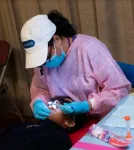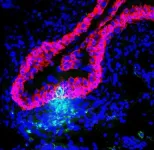INFORMATION:
Antibodies deplete cancer cells in mice and human cell lines; reach previously inaccessible targets
2021-03-01
(Press-News.org) Three studies - one each in Science, Science Translational Medicine, and Science Immunology - reveal the promise of newly engineered bispecific antibodies, including by demonstrating their power against previously inaccessible tumor cell targets for the first time, in two cases. These bispecific antibodies, which simultaneously bind to tumor antigens and T cells, cleared cancer cells without damaging healthy cells in mouse tumor models and/or cell culture experiments, across the three studies. The results highlight the therapeutic potential of this antibody type, which - unlike engineered immune cell therapies like CAR T - does not have to be personalized; it could be used "off-the-shelf."
Some immunotherapy approaches against cancers rely on common cancer-related mutations to serve as antigens; they instigate an immune response to the cancer. Although it is one of the most common mutant tumor suppressor genes known in human cancers, the cancer-related p53 tumor suppressor gene has not been successfully targeted via this approach. This is largely because it is much more challenging to reactivate this and other mutant tumor suppressor genes than it is to deactivate cancer-driving genes. In Science, Emily Han-Chung Hsiue and colleagues successfully engineered a bispecific antibody to reactivate p53. Hsiue et al. first identified a distinct targetable fragment of the mutant tumor suppressor protein and characterized the structural basis for how the fragment is presented to T cells. They developed an antibody that could recognize this fragment of the mutant p53 protein and that did not cross-react with wild-type p53 in intact cells. The researchers then converted this antibody into a bispecific antibody format that attaches one portion to mutant p53 antigen on tumor cells and another to a T cell. In mice engrafted with human multiple myeloma cells, the antibody stimulated effective T cell killing of cancer cells that express the mutant p53 protein, resulting in tumor regression. As well, experiments in cell lines revealed the mutant p53 antigen-targeting bispecific antibody could activate T cells even when the neoantigens were expressed at very low levels on the tumor cell surface.
In Science Translational Medicine, Suman Paul and colleagues employed bispecific antibodies to target malignant T cells in T cell leukemias and lymphomas without harming healthy T cells - a challenging feat in cancer immunotherapy. Therapies that broadly target B cell antigen and cause near complete loss of both healthy and cancerous B cell populations have been remarkably successful and well-tolerated by patients, but broadly targeting T cells in the same way would result in harmful immunosuppression. Paul et al. hypothesized that targeting the beta chain region of T cell receptors could serve as a potential strategy to selectively eliminate malignant T cells while avoiding collateral damage to healthy T cells. They engineered bispecific antibodies to home into either TRBV5-5 or TRBV12, two examples of the 30 beta chains that could be present on malignant T cells. They hypothesized that targeting either beta chain could clear cancer cells without harming healthy T cells that express any of the other 29 beta chain variable regions. In cell lines extracted from patients with T-cell lymphomas and leukemias, application of these bispecific antibodies effectively killed malignant T cells and preserved healthy T cells. Similarly, in mouse models of human T cell cancers, whereby mice received human T cells via intravenous injection, the antibodies promoted killing of malignant T cells without depleting healthy T cells, leading to major tumor regression.
In Science Immunology, Jacqueline Douglass and colleagues modified bispecific antibodies to recognize and kill tumor cells isolated in culture that bear extremely low levels of cancer-driving mutant RAS proteins on their surfaces. Targeting cancer-driving mutant genes like RAS has emerged as a promising strategy for formulating cancer drugs. However, the success of this treatment strategy is limited by the fact that some of these cancer-driving mutant proteins are expressed in low levels on tumor cells, making them incredibly difficult to detect - despite their ubiquity in multiple cancer types. Now, Douglass et al. have used a method called phage display to search for mutant RAS-specific antibodies from a human antibody library. Based on their findings, the researchers developed mutation-associated neoantigen-directed antibodies (MANAbodies) that target mutant RAS neoantigens on tumor cell surfaces. They grafted these mutant RAS-specific MANAbodies onto an optimized T cell-engaging bispecific antibody. Testing the MANAbody-bearing bispecific antibodies in human lung and pancreatic cancer cell lines, the researchers showed the antibodies could specifically recognize and kill tumor cells that bear extremely low levels of mutated RAS proteins, while having no effect on tumor cells that express wild-type or related mutated proteins.
"Although the studies of Hsuie et al., Douglass et al., and Paul et al. are promising for advancing [bispecific antibodies] into the clinic, there are other factors to consider before therapeutic efficacy can be fully realized," Jon Weidanz says. For example, he notes that these antibodies are small molecules that can be rapidly cleared from the blood, which will likely make it necessary to continuously infuse these kinds of drugs with an implanted pump or use other methods to extend the drug's persistence in the blood.
ELSE PRESS RELEASES FROM THIS DATE:
What's happening to the most remote coral reefs on Earth?
2021-03-01
In the middle of the Indian Ocean lies some of the last coral reef wilderness on Earth. The Chagos Archipelago, a collection of atolls, including Earth's largest - the Great Chagos Bank- is home to reefs that have been largely undisturbed by humans for the last 50 years. Some estimates indicate the Chagos Archipelago may contain more than half of the healthy coral reefs remaining in the entire Indian Ocean. These reefs are protected both by their remote location, and in one of the world's largest no-take marine reserves--the British Indian Ocean Territory (BIOT) marine protected area.
In 2015, scientists at the Khaled ...
Increase in medicaid managed care for youth linked to slightly more preventive care
2021-03-01
Youth enrollment in Medicaid managed care across all states increased from 65 percent in 2000 to 94 percent in 2017.
Across the country, receipt of preventive care for youth in Medicaid managed care increased from 49 percent in 2000 to 59 percent in 2017, falling short of the 80 percent annual goal set by the Centers for Medicare and Medicaid Services (CMS).
Receipt of preventive care for youth in Medicaid managed care showed a significant increase in 17 states, a significant drop in six states, and no change in 28 states. Tennessee had the largest increase in preventive care associated with Medicaid managed care, while North Carolina showed the largest decrease.
Nationally, the number of children under age 21 enrolled in Medicaid grew from ...
School-based dental program reduces cavities by more than 50%
2021-03-01
A school-based cavity prevention program involving nearly 7,000 elementary school students reduced cavities by more than 50 percent, according to a study led by researchers at NYU College of Dentistry. The findings are END ...
The enemy within: Understanding the mechanisms of r-chop resistance in b-cell lymphoma
2021-03-01
White blood cells or lymphocytes are the soldiers of our immune system that patrol the body via the lymphatic system. While their primary role is to protect the body by scavenging invaders, they can sometimes go rogue and become the enemy. Lymphoma, a type of blood cancer, results from the uncontrolled proliferation of lymphocytes. They are classified as Hodgkins and Non-Hodgkins lymphomas on the basis of the cell of origin and clinical characteristics. Of them, diffuse large B-cell lymphoma (DLBCL) is the most common Non-Hodgkins lymphoma and is highly aggressive and fast-growing.
A combination of rituximab plus cyclophosphamide, doxorubicin, vincristine, and prednisone (R-CHOP) is the standard treatment regimen for ...
Future of immunotherapy could be 'off-the-shelf' treatments
2021-03-01
In a new commentary for the journal Science, an associate vice president for research at The University of Texas at Arlington argues that emerging protein-based immunotherapies could lead to highly effective "off-the-shelf" cancer treatments for more patients.
Jon Weidanz, who also is a professor in the College of Nursing and Health Innovation at UTA, is the author of a perspective regarding the development of cancer immunotherapies.
His article, "Targeting cancer with bispecific antibodies," will appear in the March 5 edition of Science. It evaluates the findings of three studies by researchers at Johns Hopkins University and proposes that an emerging ...
Repurposed arthritis drug did not significantly improve severe COVID-19 pneumonia
2021-03-01
In a study published online February 25, 2021 in The New England Journal of Medicine, a repurposed drug used to treat arthritis did not significantly improve the outcomes of patients with severe COVID-19 pneumonia.
Results of the Phase III clinical trial, conducted by an international team led by senior author Atul Malhotra, MD, research chief of pulmonary, critical care and sleep medicine at UC San Diego Health, found that tocilizumab did not significantly improve clinical status or mortality rate at 28 days for participants who received it compared to a placebo.
"Although our trial was negative based on primary outcomes, we did see some benefits, including an improvement in length of stay of eight days ...
COVID-19 lockdown highlights ozone chemistry in China
2021-03-01
In early 2020, daily life in Northern China slammed to a halt as the region entered a strict period of lockdown to slow the spread of COVID-19. Emissions from transportation and industry plummeted. Emissions of nitrogen oxides (NOx) from fossil fuels fell by 60 to 70 percent.
And yet, environmental researchers noticed that ground-level ozone pollution in Beijing and the Northern China Plain skyrocketed during this time period, despite the decrease of NOx, a component of ozone.
The region is no stranger to severe ozone pollution but until about five years ago, most ozone events occurred ...
Oregon State research shows how tissue's microscopic geometry affects spread of cancer
2021-03-01
CORVALLIS, Ore. - Oregon State University research has revealed a crucial mechanism behind one of humankind's most deadly physiological processes: the movement of malignant cells from one part of the body to another.
Published in the Proceedings of the National Academy of Sciences, the study led by OSU biophysicist Bo Sun shows the role that tissues' microscopic geometry plays in cancer metastasis, the internal spreading of the disease that's responsible for 95% of all cancer deaths.
To develop drugs that effectively combat metastasis, it's fundamentally important to understand what directs the metastatic process, Sun said.
"Our results show the level of tissue fiber alignment, particularly ...
Plant clock could be the key to producing more food for the world
2021-03-01
A University of Melbourne led study has established how plants use their metabolism to tell time and know when to grow - a discovery that could help leverage growing crops in different environments, including different seasons, different latitudes or even in artificial environments and vertical gardens.
Published in the PNAS journal, Superoxide is promoted by sucrose and affects amplitude of circadian rhythms in the evening, details how plants use their metabolism to sense time at dusk and help conserve energy produced from sunlight during the day.
Lead ...
Goodbye UTIs: Duke scientists develop vaccine strategy for urinary tract infections
2021-03-01
DURHAM, N.C. - Anyone who has ever developed a urinary tract infection (UTI) knows that it can be painful, pesky and persistent. UTIs have a high recurrence rate and primarily afflict women -- as many as 50% of women will experience at least one UTI during their lifetime.
However, what if patients could take a vaccine that would prevent future UTIs? In a March 1 study in the Proceedings of the National Academy of Sciences, Duke researchers describe a new vaccination strategy that they think could re-program the body to fight off the bacteria that cause urinary tract infections.
"Although several vaccines against UTIs have been investigated in clinical trials, they have so far had limited success," said Soman Abraham, Ph.D., Grace Kerby Distinguished Professor of Pathology, Immunology ...






